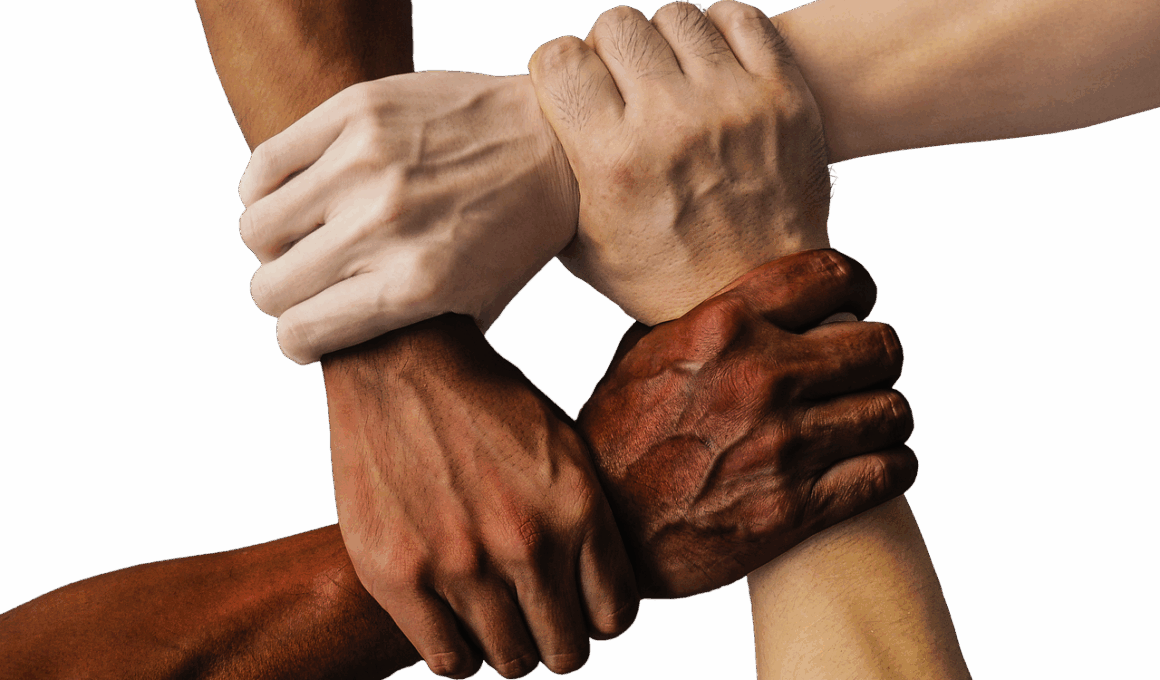Weight Loss Success: Tips from Community Leaders
Joining support groups can significantly enhance your weight loss journey. These groups provide encouragement, accountability, and motivation to members. Connecting with others who share similar challenges helps in building strong relationships. Supporting one another leads to better emotional health and stress relief, which are crucial for successful weight management. Many community leaders suggest participating actively in group discussions. Share your struggles and triumphs as this fosters a sense of belonging. Additionally, consider setting realistic weight loss goals that are achievable. It is essential to track your progress, whether through group meetings or personal journals. Keep an open mind to feedback from peers. They might offer valuable insights based on their experiences. Lastly, always remember to celebrate small milestones. Acknowledgment of progress keeps spirits high and encourages continued effort in reaching ultimate fitness goals. This communal spirit cultivates resilience, making the path to weight loss much more enjoyable and sustainable.
Various community leaders emphasize the importance of nutrition education in support groups. Understanding how to make healthy food choices lies at the core of effective weight management. Many groups host nutrition workshops where experts share practical tips. Such educational sessions break down food labels and teach about portion control. Members learn to cook healthy meals that are both nutritious and satisfying. It’s vital to foster a culture of healthy eating within your group. Organize potluck meals where everyone brings a healthy dish, allowing members to explore diverse culinary options. Discussion about different experiences with specific diets can lead to valuable lessons. Additionally, online resources, such as meal planning apps and healthy recipe sites, can supplement what is learned in-person. Always encourage creativity in meal preparation, as this keeps the menu exciting. This balance between education and interaction creates a supportive atmosphere. When each member understands the importance of proper nutrition, they can better support one another. Furthermore, sharing favorite recipes or snack ideas helps build a sense of community. Empowering each other through knowledge will dramatically increase weight loss success rates.
The Role of Accountability
Accountability is a crucial element in reaching weight loss goals through support groups. Community leaders frequently recommend forming accountability partnerships within these groups. These pairs encourage one another to stay focused on their targets. Checking in regularly fosters commitment and enhances motivation. Regular accountability meetings where members discuss their challenges and achievements can yield substantial benefits. This collective effort creates a sense of responsibility that keeps participants on track. Leaders often suggest setting specific times for these check-ins. Whether weekly or bi-weekly, these sessions should be consistent, allowing for relationship-building among participants. Besides one-on-one partnerships, consider group challenges. Friendly competitions often spark enthusiasm and foster teamwork. Implementing themes, such as a weight-loss challenge, can spur motivation. Participants track their results, offering encouragement and celebrating progress as a group. This collective effort toward wellness instills a strong community bond. However, ensure there is a focus on positive reinforcement and support. Criticism needs to be constructive to nurture growth within the group without negativity. Therefore, support groups flourish when accountability is upheld through collaboration.
In addition to accountability, emotional support plays a vital role in weight loss success. Community leaders recognize the mental aspects of weight management. They highlight that emotional well-being influences eating behaviors and overall health. Many groups provide a safe space for discussion related to self-esteem and body image issues. Sharing these personal experiences can facilitate healing and foster solidarity. Leaders suggest integrating mindfulness practices such as meditation or yoga into the group curriculum. Such activities promote mental clarity and reduce anxiety surrounding weight loss. Establishing “check-in” moments during meetings allows members to express feelings openly. Supportive environments where individuals feel comfortable discussing struggles can enhance the likelihood of achieving goals. Additionally, providing resources for professional counseling can be extremely beneficial. These sessions can help with deeper emotional issues surrounding weight gain or loss. Organizing workshops that focus on mental health further aids community well-being. The combination of emotional and physical support creates a holistic approach to weight management. Furthermore, cultivating resilience through shared experiences inspires growth and personal development among group members. This ongoing exchange strengthens the group dynamic, crucial for long-term success.
Finding and Maintaining Motivation
Staying motivated during the weight loss journey requires constant effort, a fact emphasized by community leaders. They recommend setting up motivational strategies within support groups. Members can create vision boards displaying goals and inspirational quotes to keep spirits high. This visual representation acts as a constant reminder of what everyone is working towards. Engaging in weekly activities that reinforce commitment can also be beneficial. Simple actions like group workouts or cooking demonstrations make fitness and nutrition enjoyable. Furthermore, leaders encourage tracking progress through various mediums. Creating a group shared document or a social media page can enable members to share their achievements and challenges freely. Another vital piece of advice is to adjust goals regularly. If a target seems unachievable, recalibrating can alleviate pressure. Celebrate even minor achievements, as these contribute to overall success. Motivational guest speakers or success stories from former group members can serve as inspiration. Invite them to share their journeys, showcasing the power of persistence. This infusion of fresh perspectives energizes the group dynamics. Nurturing motivation becomes a shared journey, revealing how togetherhood can lead to sustainable outcomes in weight loss .
Building supportive environments fosters a community where individuals are empowered. This empowerment is critical for participants struggling with weight loss. Community leaders often highlight the importance of relationships formed within support groups. These relationships provide essential support systems that extend beyond meetings. Encouraging regular interactions among members can strengthen these bonds. Utilize technology to facilitate communication outside of meetings through group chats or social media groups. This ongoing dialogue can help with accountability and motivation. Additionally, organizing regular social events can further deepen connections. Fun, non-food-related gatherings create opportunities for members to enjoy healthier lifestyles together. Activities like hiking, group sports, or movie nights can engage every member in a supportive way. This camaraderie nurtures long-lasting friendships, which enhances emotional support. Support outlets are crucial when challenges arise, as members can provide encouragement during setbacks. As relationships develop, individuals are more likely to share their triumphs and struggles. These heartfelt connections ultimately contribute to a safe space for group members. When participants view their support group as a home, it fosters both personal growth and success in weight loss endeavors. Building a community spirit is vital to sustain motivation.
Conclusion: The Power of Community
Emphasizing the power of community, many leaders conclude that success in weight loss is deeper than numbers. It involves relationships, understanding, and motivation cultivated in supportive environments. Participating in these groups should never feel burdensome. Instead, they should serve as uplifting experiences filled with joy and encouragement. Members celebrating achievements collectively foster accountability and inspire ongoing commitment. Building friendships within support systems often enhances emotional resilience, allowing better coping strategies. As members learn from one another, different weight-loss methods are explored. Adaptability is essential for success as each individual responds differently to diets and exercise routines. Using communal knowledge to inspire unique approaches leads to sustainable results. Weight loss journeys benefit from ongoing discussions that educate and uplift. These support communities bring valuable insights into overcoming challenges and celebrating successes. The emotional effects of being part of a community that cares cannot be overstated. Overall, as individuals forge connections, they often find themselves happier and healthier, contributing to overall life satisfaction. Remember that success in weight loss is multidimensional. Adopting a community-focused perspective enhances every individual’s participation in their weight loss journey.
In conclusion, embarking on a weight-loss journey can be challenging. However, being part of a support group helps to ease the path. These groups provide invaluable tools such as accountability, motivation, and emotional support. Share your stories freely and learn from others who have walked the same road. It’s essential to focus on education, understanding nutrition and how it impacts wellness. Using shared resources leads to informed decisions and healthier lifestyles within the community. Sports, cooking classes, and group activities propel participants toward healthier choices collaboratively. Establish friendships that motivate and uplift, creating a support network that extends beyond meetings. Attend workshops or events designed to strengthen relationships and share knowledge among members. This sense of belonging reinforces the group’s impact on individual success. Celebrate the achievements together, no matter how big or small, and encourage others to continue with their efforts. Lastly, remember that everyone’s journey is unique, and that’s perfectly okay. Embrace your strength and determination, both individually and as part of a larger community. Always strive for progress rather than perfection in your weight loss efforts and maintain an open heart and mind to embrace support.


